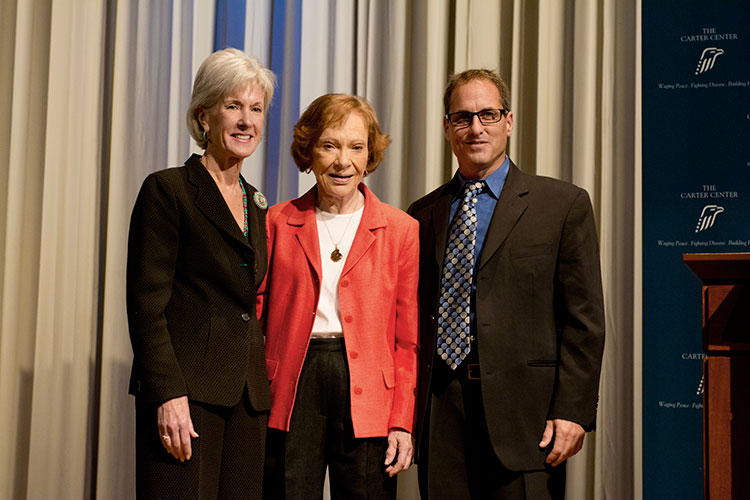Carter Center expert Dr. John Bartlett, a senior project adviser to the Mental Health Program and organizer of this year’s 29th Annual Rosalynn Carter Symposium on Mental Health Policy, answers your questions submitted via email.
Q: Why did the Center hold a symposium on the Affordable Care Act?
The Affordable Care Act is an important step forward in progress toward affordable, quality mental health and substance abuse care for all Americans. The Carter Center hosted a symposium on health care reform in 2009, and we wanted to revisit it this year to track progress.
Q: What is mental health parity?
In the past people often had health insurance benefits that separated medical/surgical benefits from mental health/substance abuse benefits, with the latter having a separate deductible and much more restrictive limits. Parity prevents this kind of discrimination against those who have a mental illness or a substance abuse issue.
Q: How does parity fit in with the Affordable Care Act?
Parity was established for mental health and substance abuse benefits in 2008 with the passage of the Mental Health Parity and Addiction Equity Act. However, the law only applied if mental health and substance abuse benefits were offered. The Affordable Care Act actually requires that mental health and substance abuse benefits are offered as one of 10 essential health benefits in all insurance plans sold through the states’ small group and individual health insurance marketplaces.
Q: What does Secretary Sebelius’ announcement mean for mental health parity?
Secretary Sebelius released a final rule on mental health parity at the Carter Center’s symposium specifying all the levels of care and services that need to be provided for mental health and substance abuse benefits. This is monumental because parity has never been defined operationally before. Now, with the release of this final rule, insurance providers must offer these different levels of care and services with no discriminatory or separate limitations or restrictions.
By announcing the final parity rule at Mrs. Carter’s symposium, Secretary Sebelius made an incredibly significant and meaningful acknowledgment of Mrs. Carter’s work during the last 40 years. Mrs. Carter has devoted most of her leadership around mental health and addiction issues to making sure that people have access to appropriate, high-quality care, and she was instrumental in the passage of the Mental Health Parity and Addiction equity Act of 2008.
Q: When I visit my health care provider’s office, how will my visit change?
Your health care provider should begin incorporating behavioral health screenings into your visits. If not, I would recommend that people start asking why they are not being screened for depression or substance abuse. I would ask who the behavioral health specialist is in the practice or which one is associated with your team of clinicians. People should start asking these questions and create the demand for this type of health care.

On Nov. 8, 2013, Health and Human Services Secretary Kathleen Sebelius (left), former First Lady Rosalynn Carter (center), and David Wellstone (right), son of the late Senator Paul Wellstone, celebrated the release of final regulations on mental health parity during the 29th Annual Rosalynn Carter Symposium on Mental Health Policy held at The Carter Center in Atlanta. (Photos: Carter Center/D. Hakes)
Related Resources
Read CNN’s “Feds Boosting Mental Health Access, Treatment”>>
Please sign up below for important news about the work of The Carter Center and special event invitations.